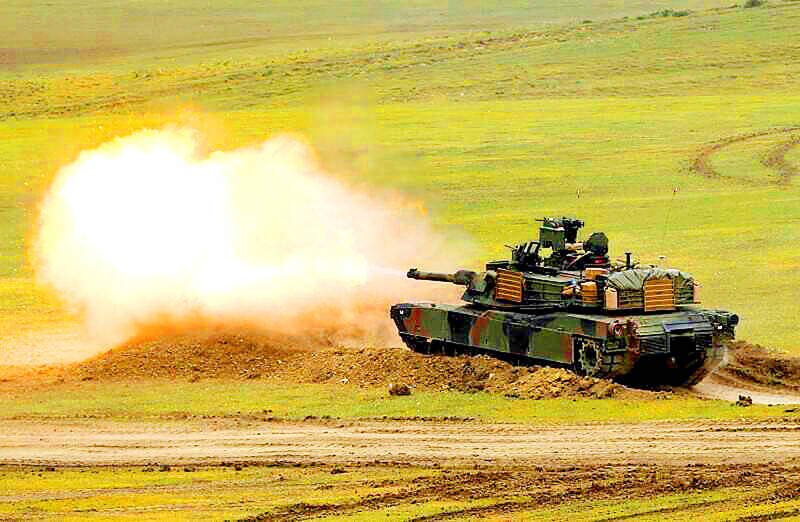The army is to take possession of an additional 42 US-made M1A2T Abrams tanks before the end of the month, and would hold live-fire drills with its existing Abrams tanks from June 18 to 27, a source said yesterday.
The army received 38 of the tanks last year, and would hold drills with them at its shooting range at Kengzihkou (坑子口) in Hsinchu County this month before their formal commissioning in the second half of the year, the source said.
The estimate on the tanks’ arrival this month is based on a budget report sent by the Ministry of National Defense to the Legislative Yuan, which indicated that 42 of the tanks would arrive this quarter, and that another 28 tanks from the same procurement are expected to arrive in the first quarter of next year, the source said.

Photo: Reuters
The exact date of the drills became clear when a notice was posted by the Fisheries Agency warning fishers to stay clear of waters near the coast of Kengzihkou.
The post indicates a danger zone with a minimum radius of 3 nautical miles (5.56km) and a maximum projectile altitude of 610m, the source said.
The details in the notice match those of previous live-fire exercises with M60A3 and CM11 tanks, as the parameters set for those tests are safe for the M1A2T’s 120mm tank gun, which has an effective firing range of about 4km, they said.
The army has been making “tangible progress” to its readiness reforms, specialized personnel deployment, upgrades to training grounds and improvements in unit training, the ministry-affiliated Youth Daily News yesterday cited Commander of Army Headquarters General Lu Kun-hsiu (呂坤修) as saying.
The army last year also took delivery of the first 11 of 29 sets of M142 High Mobility Artillery Rocket System packages it ordered from the US — with which it has completed live-fire drills — and would acquire various types of drones for different divisions of the military, he said.
Reforms in reservist training, the Han Kuang military exercises and integrated joint brigade drills have also yielded gradual results, he said.
“The army would continue to follow the operational guidance of Chief of the General Staff Mei Chia-shu (梅家樹), staying ahead of evolving threats and changes on the future battlefield,” he said. “We must continue to adapt military strategy, integrate new weapon systems, and steadily improve the army’s overall combat effectiveness.”
The government is continuing efforts to improve service conditions under the military’s “Hsing-an Project” (興安專案), which aims to enhance the living environment of military personnel.
Addressing public concern about the progress of training facilities for the Abrams tanks, Lu said that while only about 30 percent of the main facilities at the Kengzihkou training range had been completed last month when a report was made to the legislature, the primary firing platform had been completed.

NATIONAL SECURITY THREAT: An official said that Guan Guan’s comments had gone beyond the threshold of free speech, as she advocated for the destruction of the ROC China-born media influencer Guan Guan’s (關關) residency permit has been revoked for repeatedly posting pro-China content that threatens national security, the National Immigration Agency said yesterday. Guan Guan has said many controversial things in her videos posted to Douyin (抖音), including “the red flag will soon be painted all over Taiwan” and “Taiwan is an inseparable part of China,” while expressing hope for expedited “reunification.” The agency received multiple reports alleging that Guan Guan had advocated for armed reunification last year. After investigating, the agency last month issued a notice requiring her to appear and account for her actions. Guan Guan appeared as required,

A strong cold air mass is expected to arrive tonight, bringing a change in weather and a drop in temperature, the Central Weather Administration (CWA) said. The coldest time would be early on Thursday morning, with temperatures in some areas dipping as low as 8°C, it said. Daytime highs yesterday were 22°C to 24°C in northern and eastern Taiwan, and about 25°C to 28°C in the central and southern regions, it said. However, nighttime lows would dip to about 15°C to 16°C in central and northern Taiwan as well as the northeast, and 17°C to 19°C elsewhere, it said. Tropical Storm Nokaen, currently

‘NATO-PLUS’: ‘Our strategic partners in the Indo-Pacific are facing increasing aggression by the Chinese Communist Party,’ US Representative Rob Wittman said The US House of Representatives on Monday released its version of the Consolidated Appropriations Act, which includes US$1.15 billion to support security cooperation with Taiwan. The omnibus act, covering US$1.2 trillion of spending, allocates US$1 billion for the Taiwan Security Cooperation Initiative, as well as US$150 million for the replacement of defense articles and reimbursement of defense services provided to Taiwan. The fund allocations were based on the US National Defense Authorization Act for fiscal 2026 that was passed by the US Congress last month and authorized up to US$1 billion to the US Defense Security Cooperation Agency in support of the

PAPERS, PLEASE: The gang exploited the high value of the passports, selling them at inflated prices to Chinese buyers, who would treat them as ‘invisibility cloaks’ The Yilan District Court has handed four members of a syndicate prison terms ranging from one year and two months to two years and two months for their involvement in a scheme to purchase Taiwanese passports and resell them abroad at a massive markup. A Chinese human smuggling syndicate purchased Taiwanese passports through local criminal networks, exploiting the passports’ visa-free travel privileges to turn a profit of more than 20 times the original price, the court said. Such criminal organizations enable people to impersonate Taiwanese when entering and exiting Taiwan and other countries, undermining social order and the credibility of the nation’s